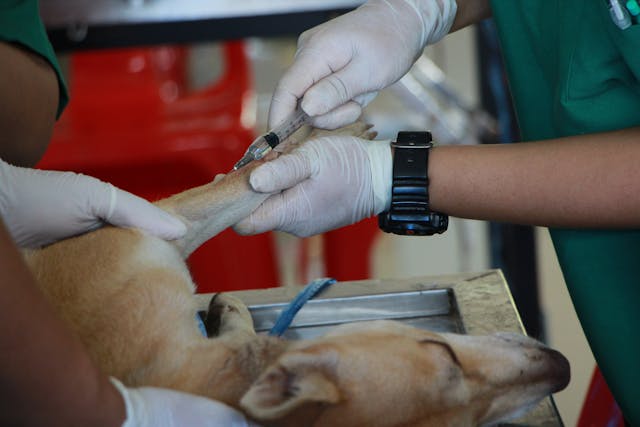Pets are cherished family members, but sudden illnesses or accidents can happen at any time. In Huntersville, where many households share their homes with dogs and cats, knowing when to seek emergency veterinary care is essential. While routine issues can often wait for your regular vet, some situations require immediate action.
This guide explains the warning signs of emergencies, what to do on the way to a clinic, and local considerations specific to Huntersville pet owners.
Breathing Problems or Choking
If your pet suddenly struggles to breathe, wheezes, or appears to choke on a toy or bone, it is a medical emergency. Warning signs include pale gums, drooling, and labored breathing.
Clinics near I-77 and around Lake Norman offer 24/7 services for respiratory distress cases. Because time is critical, reaching a clinic quickly can determine recovery outcomes.
Serious Injury or Sudden Paralysis
Accidents like being struck by a vehicle or falling from a porch or deck can cause injuries that aren’t immediately visible. Internal bleeding, fractures, or neurological damage may only show through shock, limping, or sudden inability to stand.
Emergency vets in Huntersville are equipped with imaging technology to diagnose hidden trauma. Delays in treatment can worsen the damage, so prompt care is essential.
Repeated Vomiting or Diarrhea
Mild stomach upset is common in pets, but repeated vomiting or diarrhea over a short period—especially with blood or lethargy—can indicate poisoning or infection.
Local risks: Pets in Huntersville may ingest yard chemicals, spoiled food, or contaminated lake water from Lake Norman. Bringing a stool or vomit sample to the clinic can help with diagnosis.
Seizures or Loss of Consciousness
Seizures can appear as uncontrolled shaking, drooling, or brief paralysis. A single short episode may not be life-threatening, but repeated or prolonged seizures are emergencies. Loss of consciousness may also indicate cardiac issues or low blood sugar.
Bloating or Swollen Stomach
A distended stomach with restlessness or failed vomiting attempts can point to gastric dilatation-volvulus (GDV). This life-threatening condition is most common in large dogs and requires immediate surgery. Huntersville clinics are trained to stabilize and operate on these cases without delay.
Toxic Ingestions
Pets are curious explorers. Common toxins in Huntersville households include:
- Chocolate and grapes
- Antifreeze (especially dangerous in colder months)
- Certain local plants (azaleas, lilies, sago palm)
- Essential oils (tea tree, eucalyptus, peppermint)
Bring packaging, plant samples, or labels with you to the clinic. Quick identification allows faster and more accurate treatment.
Common Local Pet Emergencies in Huntersville
- Heatstroke: Summers in Mecklenburg County bring high heat and humidity, raising risks for dogs left outside. Signs include heavy panting, drooling, or collapse.
- Snake bites: Copperheads are common across the Carolinas, including wooded areas near Huntersville. Swelling and sudden pain at the bite site require urgent care.
- Blue-green algae: Pets swimming in Lake Norman can ingest harmful algae, leading to vomiting, seizures, or liver damage. Immediate vet attention is necessary if symptoms appear after lake exposure.
First Aid Before Arriving at the Clinic
While professional care is essential, pet owners can take steps to stabilize their pets on the way:
- Choking: Try gently sweeping the mouth to remove objects. For dogs, a modified Heimlich maneuver may help.
- Bleeding: Apply gentle pressure with a clean cloth or bandage.
- Seizures: Move pets away from sharp objects and keep them safe until the episode passes—do not restrain them.
- Heatstroke: Cool the pet with damp towels and offer small amounts of water.
Avoid giving human medications unless directed by a veterinarian.
Emergency Vet Clinics & Costs in Huntersville
Several clinics serve Huntersville and nearby areas:
- Carolina Veterinary Specialists (Huntersville): 24/7 emergency care with surgical facilities.
- Animal Emergency & Specialty Care (near Lake Norman): Handles urgent cases after hours.
If you’re searching for a trusted Huntersville emergency vet, both of these facilities provide critical care for pets during accidents, sudden illnesses, or after-hours needs.
Typical costs:
- Exam fee: $100–$200
- Diagnostics (X-ray, bloodwork): $150–$500
- Emergency surgery: $1,000–$3,000+
Pet insurance or payment plans can help manage unexpected expenses.
Preventing Emergencies
Many emergencies are preventable with simple steps:
- Secure trash and toxic household items.
- Fence yards to prevent traffic accidents.
- Avoid leaving pets outdoors in extreme heat.
- Schedule regular vet checkups to catch health problems early.
FAQs
What’s the average cost of an emergency vet visit in Huntersville?
Expect $500–$2,000 depending on diagnostics and treatment.
Are there 24-hour clinics near Lake Norman?
Yes, multiple emergency facilities serve Huntersville and surrounding Lake Norman communities.
How do I know if it’s a true emergency?
If your pet struggles to breathe, is unresponsive, has repeated vomiting/diarrhea, or suffers a major injury, it’s always safest to seek immediate care.
Final Thoughts
Emergencies are stressful, but preparation and awareness make all the difference. In Huntersville, knowing the risks—heat, lake exposure, and local wildlife—helps pet owners act quickly. Always trust your instincts: if something feels wrong, an emergency vet visit is the safest choice for your pet’s well-being.




